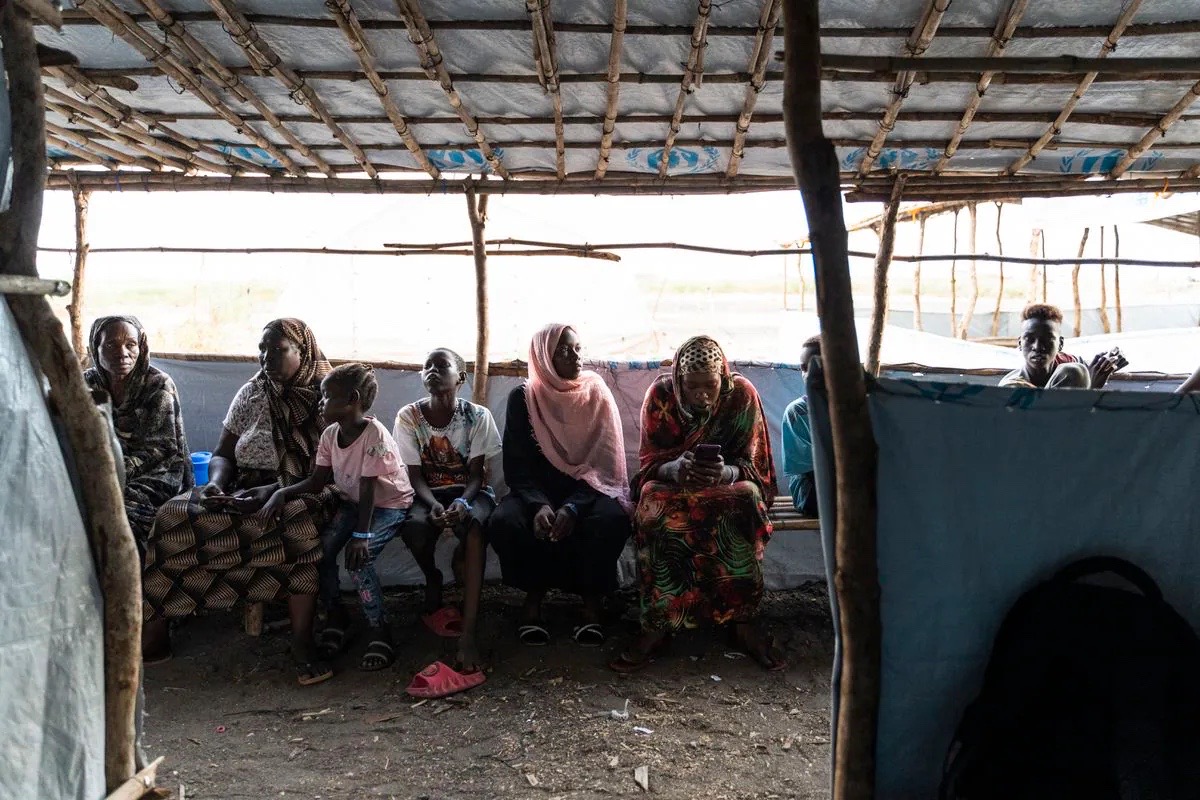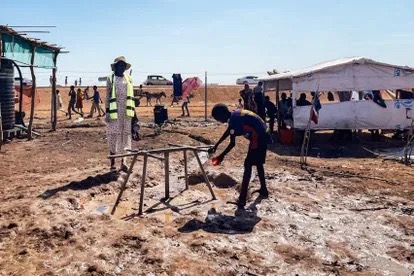"THE country, South Sudan, seems to be going round in circles from one calamity to the next and back. The saddest reality is our inability to overcome the effects of these calamities and cushion our people against them." He [Bishop Kussala] said that unless these issues are addressed, he fears his people will not survive, “especially because the majority of the population (64%) are helpless youths who have no source of income, while most of the remaining 36% are elderly persons.” Read more.
Dated Monday, 11 March 2024 - here is a copy in full:
South Sudan Bishop: Our People ‘on Brink of Destitution, Slowly Perishing’
Bishop Hiiboro Kussala painted a grim picture of the situation of women, girls, and children in the world’s newest and youngest country, which gained independence from Sudan in July 2011.
 Photo: A camp for Internally Displaced Persons in Renk, South Sudan. (Credit: Dicastery for Promoting Integral Human Development)
Photo: A camp for Internally Displaced Persons in Renk, South Sudan. (Credit: Dicastery for Promoting Integral Human Development)
In a March 8 letter addressed to “the head of Caritas network, people of goodwill, and the international community,” Bishop Eduardo Hiiboro Kussala described the desperate situation of his compatriots, who he says are “on the brink of destitution” and are “slowly perishing” amid challenges occasioned by violent conflicts and COVID-19.
“Our people continue to suffer the effects of complex emergencies, which are still being experienced in many parts of the country, including those parts that had previously been peaceful,” Bishop Hiiboro Kussala said in his three-page letter dated March 8.
The number of internally displaced persons (IDPs) “has increased tremendously across the country,” he said, adding that these are South Sudanese “living in deplorable conditions and are starving.”
The bishop, who leads South Sudan’s Diocese of Tombura-Yambia, highlighted the fact that “women, children, the aged, and people living with disabilities” are bearing the brunt of the conditions in the East-Central African nation.
Bishop Hiiboro Kussala painted a grim picture of the situation of women, girls, and children in the world’s newest and youngest country, which gained independence from Sudan in July 2011.
“Consider the South Sudanese mother who watches her child die because of malnutrition caused by severe hunger; the young man who dies in the hospital because there is no medicine to treat him; the 9-year-old girl who, for a piece of ‘bambe’ [potato], is forced to sell her body; and the emaciated old woman who is lying inside her ramshackle hut awaiting death to take away her suffering,” he said.
“Those still living in their homesteads are equally facing starvation since most of them have had to, ironically, abandon their sources of livelihood in a bid to save their lives,” he said. “Most school children have had to drop out of school because of insecurity and fear of being forcefully recruited to serve as soldiers in the conflicts.”
These challenges are compounded by earlier negative effects of COVID-19 restrictions, Bishop Hiiboro Kussala further lamented, explaining that “South Sudan is also still struggling to overcome the effects of the COVID-19 pandemic, which saw our already fragile economy come to a near collapse.”
“COVID-19 saw many people lose their jobs and livelihoods, causing those who were previously self-reliant to become dependent on well-wishers,” he said.
The challenges of the people of God in South Sudan have worsened by the country’s “skyrocketing inflation,” the bishop noted, adding that “many people can no longer afford to buy even the cheapest of foodstuff. As a result, the poverty levels in the country have increased, with the number of families going hungry escalating.”
“The state of calamities in the country has been worsened by floods in some areas and severe drought in others,” he lamented. “The country, South Sudan, seems to be going round in circles from one calamity to the next and back. The saddest reality is our inability to overcome the effects of these calamities and cushion our people against them.”
He said that unless these issues are addressed, he fears his people will not survive, “especially because the majority of the population (64%) are helpless youths who have no source of income, while most of the remaining 36% are elderly persons.”
As president of the Commission for Integral Human Development of SCBC, which brings together Catholic bishops in Sudan and South Sudan, Hiiboro Kussala appealed for external support, imploring them to “not get tired of our knocking on your doors once again and again … because you are our only hope and therefore light at the end of the tunnel.”
“It is no longer about the country and its leadership but about the people of South Sudan, who are slowly perishing,” the bishop said.
In his letter, the bishop acknowledged with appreciation the support of the international community over the years. “You have been our anchor amid troubled waters, and we can only say thank you and pray that the good God may reward you in ways that only he can,” he said.
View original: https://www.ncregister.com/cna/south-sudan-bishop-our-people-on-brink-of-destitution-slowly-perishing
END

.jpeg)








